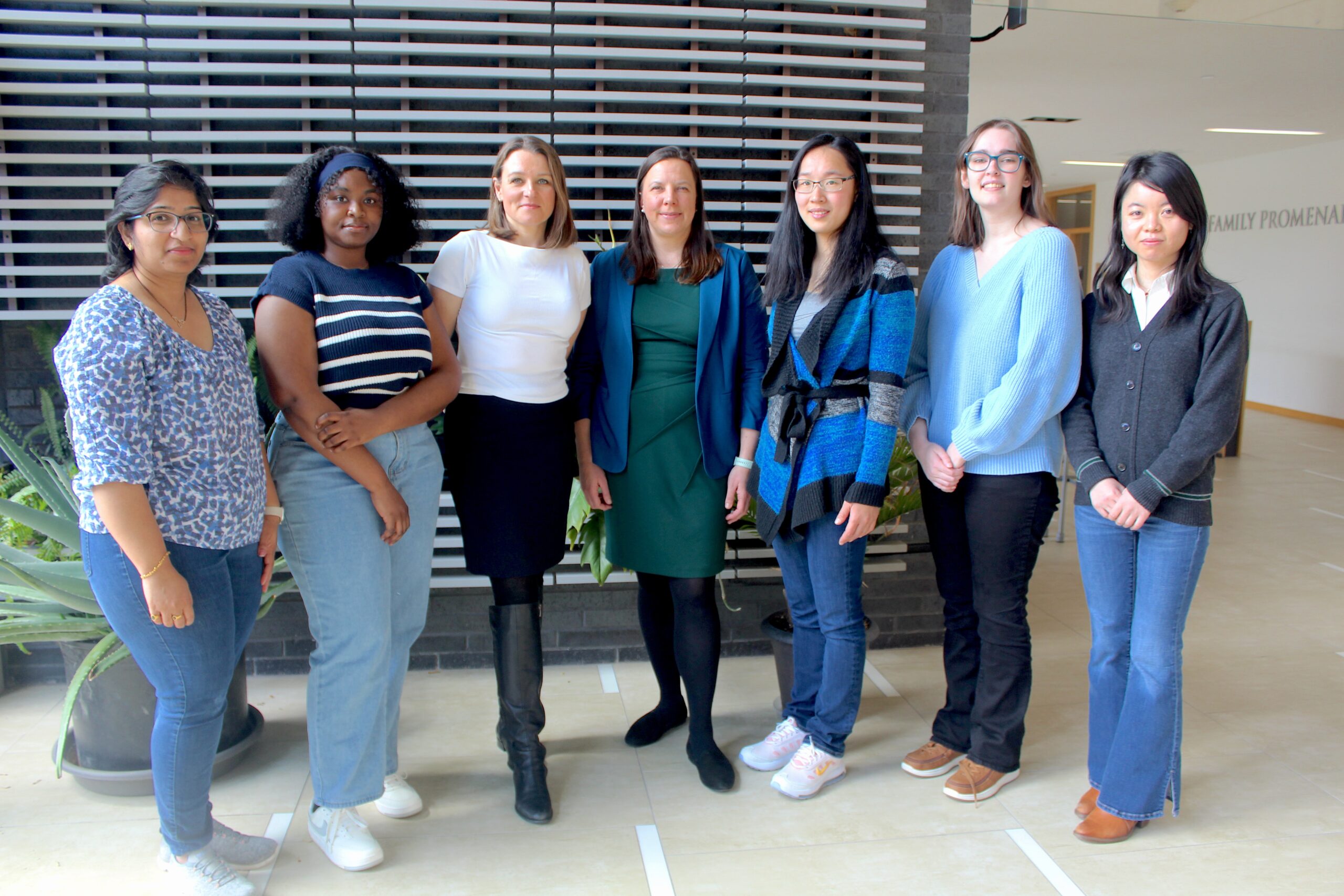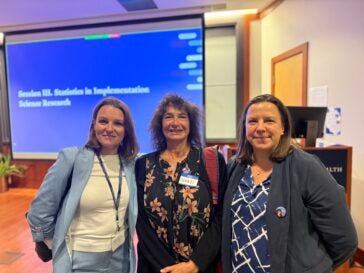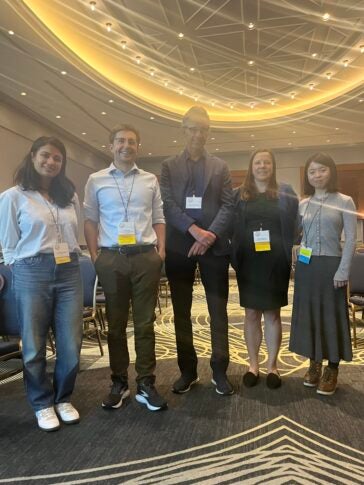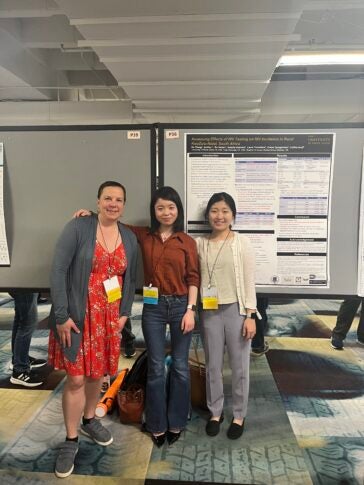Overview
Founded and directed by Drs. Ashley Buchanan and Natallia Katenka, the Networks and Causal Inference for Public Health and Education Research (NCIPHER) lab at the College of Pharmacy focuses on applying and synthesizing causal inference and network science to address some of the most pressing public health and educational challenges, such as harm reduction measures among people who use drugs, increasing pre-exposure prophylaxis uptake among men who have sex with men, and improving learning in undergraduate statistics education.
We recognize in these public health contexts that interventions may not only benefit the treated patients or exposed students and participants, but also their partners and contacts. Participants in intervention studies are often part of underlying networks even if networks are not explicitly measured or a focus of the study. Importantly, spillover likely occurs in these networks and is largely ignored in the evaluation of HIV interventions and substance use disorder treatment, often underestimating the full intervention impact. Measuring spillover will address the high burden of HIV in marginalized populations because it can expand the reach of HIV intervention benefits to individuals not connected to traditional research and clinical settings while strengthening communities of individuals impacted by HIV.
The research lab provides a collaborative, supportive environment for graduate students, postdoctoral fellows, and faculty through weekly team meetings, journal club, statistical program code review, presentation opportunities at URI and beyond, and one-on-one faculty mentoring for research projects. The lab has supported the studies and research of eight graduate students and two postdoctoral fellows over the past six years, and these mentees have continued to internships and employment at Bayer Pharmaceuticals, Brown University, Thomas Jefferson University, Harvard Medical School, Beth Israel Hospital, and the Harvard T.H. Chan of School of Public Health.
The NCIPHER Lab is supported by awards from the National Institutes of Health (NIH: R01DA058994, R01MH134715), and Institutional Development Award Number U54GM115677 from the National Institute of General Medical Sciences of the National Institutes of Health, which funds Advance Rhode Island Clinical and Translational Research (Advance RI-CTR). Support from the Biomedical Informatics Core of Advance RI-CTR was received. The lab was previously supported by the Avenir Award from the NIH National Institute on Drug Abuse (DP2DA046856).
The content is solely the responsibility of the authors and does not necessarily represent the official views of the National Institutes of Health.

Acknowledgments and Funding
Funding Agency: National Institute on Drug Abuse
Title: Network-based study design, statistical, and modeling solutions for HIV among populations that use illicit substances: Informing interventions and policy in real-world settings using existing data (R01 Year 1)
NIH NIDA Grant # R01DA058994
PI: Buchanan
Project Period: 09/15/24-7/31/29
Funding Agency: National Institute of Mental Health
Title: Developing Causal Inference Methods to Evaluate and Leverage Spillover Effects through Social Interactions for Designing Improved HIV Prevention Interventions
NIH NIMH Grant# R01MH134715
PI: Forastiere
Project Period: 07/01/23-06/30/28
Funding Agency: National Institute on Drug Abuse
Title: Diversity Postdoctoral Fellowship for Parent Project Causal Inference Methods for HIV Prevention Studies Among Networks of People Who Use Drugs
NIH NIDA Grant # DP2 DA046856
PI: Buchanan
Project Period: 07/01/19 – 05/31/21
Funding Agency: National Institute on Drug Abuse
The Avenir Award Program for Research on Substance Use Disorders and HIV/AIDS (DP2)
Title: Causal Inference Methods for HIV Prevention Studies Among Networks of People Who Use Drugs
NIH NIDA Grant # DP2 DA046856
PI: Buchanan
Project Period: 07/01/18 – 05/31/23
Funding Agency: University of Rhode Island Proposal Development Grant
Title: Causal Inference Methods for HIV Prevention Studies of Multifaceted Interventions Among Networks of People Who Inject Drugs
PIs: Buchanan and Katenka
Project Period: 07/01/18 – 06/30/19
Funding Agency: Rhode Island Foundation Medical Research Grant
Title: New Methods to Evaluate the Effects of Opioids in Provider-Based Networks
PI: Buchanan
Project Period: 04/01/17 – 09/30/18
Funding Agency: Brown University Advance CTR Pilot Project
Title: New Methods to Evaluate the Effects of Opioids in Provider-Based Networks
NIGMS Grant # U54GM115677
PIs: Buchanan and Bratberg
Project Period: 05/01/18 – 04/30/19
Team
We are the Networks and Causal Inference for Public Health and Education Research team at the University of Rhode Island. Our research involves statistical methods development combining causal inference and network analysis approaches to address high priority questions in public health and education.
Team Members
Current team members
NCIPHER Co-Founder, Co-director, Associate Professor of Biostatistics
Dept. of Pharmacy Practice, College of Pharmacy
401.874.4739
buchanan@uri.edu
NCIPHER Co-Founder, Co-Director, Associate Professor of Data Science
Dept. of Computer Science and Statistics
Graduate Chair, Statistics and Associate Professor
Dept. of Computer Science and Statistics
Postdoctoral Fellow
Dept. of Pharmacy Practice, College of Pharmacy
Graduate Research Assistant
Dept. of Computer Science and Statistics
Past team members
Post Doctoral Fellow
Graduate Research Assistant
Collaborators
Assistant Professor of Biostatistics on the Teaching Scholar Track
Brown University
Founding Director of the People, Place & Health Collective (PPHC), and Professor of Epidemiology
Brown University School of Public Health
Vice Chair, Department of Health, Behavior, and Society Professor
John Hopkins Bloomberg School of Public Health
Susan Dwight Bliss Professor of Biostatistics; Professor, Department of Statistics and Data Science; Founding Director, Center for Methods in Implementation and Prevention Science (CMIPS); Director, Interdisciplinary Research Methods Core, Center for Interdisciplinary Research on AIDS (CIRA); Assistant Director, Global Oncology, Yale Cancer Center; Affiliated Faculty, Yale Institute for Global Health
Yale School of Public Health
Assistant Professor in Epidemiology
Boston University School of Public Health
Professor and Head of Biostatistics, Bioinformatics and Epidemiology Program Vaccine and Infectious Disease Division, and Professor Public Health Sciences Division
Fred Hutch Cancer Center
Associate Professor in Biostatistics
John Hopkins Bloomberg School of Public Health
Associate Professor of Biostatistics, Associate Professor of Ecology and Evolutionary Biology, Associate Professor of Management, and Associate Professor of Statistics and Data Science; Co-director, Public Health Modeling Concentration
Yale School of Public Health
Assistant Professor of Epidemiology and Public Health at the Medical School
Medical School, University of Cyprus, Nicosia, Cyprus
Researcher
Medical School, University of Cyprus, Nicosia, Cyprus
Professor of Statistics
Department of Mathematics & Statistics, University of Cyprus
Assistant Professor of Biostatistics
Yale Institute for Global Health
Assistant Professor
Université du Québec à Montréal (UQUAM)
Associate Professor Community Health and Social Sciences
City University of New York School of Public Health
Research Scientist in Biostatistics; Associate Director, Interdisciplinary Research Methods Core, Center for Interdisciplinary Research on AIDS; Affiliated Faculty, Yale Institute for Global Health
Center for Methods in Implementation and Prevention Science, Yale School of Public Health
Senior Theoretician and Associate Director of the Infectious Disease Epidemiology and Theory Core at the Center for Drug Use and HIV Research (CDUHR), and Research Professor, Department of Population Health
Center for Opioid Epidemiology and Policy in the Department of Population Health at NYU Grossman School of Medicine
Professor
College of Pharmacy, URI
Manning Assistant Professor of Biostatistics
Brown University
News
- Ke Zhang presents her research at the Center for Methods in Implementation Science (CIMPS) seminar
Congratulations to Ke Zhang for her excellent presentation on assessing spillover effects of HIV testing on HIV incidence in rural KwaZulu-Natal, South Africa at the CIMPS seminar on September 17 2025 at the Yale School of Public Health in New Haven, Connecticut. Way to go!
- Ke Presents at the New England Statistical Symposium 2025
Congratulations to Ke Zhang on her presentation about assessing the effects of HIV testing on HIV incidence in rural KawZulu-Natal, South Africa at the 38th annual New England Statistical Symposium in New Haven, Connecticut on June 3, 2025!
- Dr. Donna Spiegelman’s Birthday Symposium
On October 3 2025 our team visited the Yale School of Public Health to celebrate Dr. Donna Spiegleman’s distinguished career in biostatistics and epidemiology with a celebratory research symposium! Thanks to Dr. Buchanan for her contributions on the organizing committee as well as presenting a session on causal inference. Happy birthday Donna!

- American Causal Inference Conference presentations 2025
Congratulations to Dr. Ashley Buchanan, Ke Zhang, and our collaborator from NYU Dr. Sam Adhikari on their presentations at ACIC in Detroit, Michigan this past May! Dr. Adhikari chaired a session alongside Dr. Buchanan and Ke on targeted and double/ debiased machine learning with applications to public health studies with interference. Ke also presented her poster about her project assessing the effects of HIV rapid testing on HIV incidence in rural KwaZulu-Natal, South Africa. Excellent job, team!
- 2023 Presentation at IBS
Congratulations to Dr. Youjin Lee for presenting about the paper, “Finding influential subjects in a network using a causal framework,” at the International Biometric Society (IBS) Journal Club in April 2023!
- 2023 Pathogens Paper!
Congratulations to Dr. Ashley Buchanan et. al. whose paper Methods for Assessing Spillover in Network-Based Studies of HIV/AIDS Prevention among People Who Use Drugs was accepted in the journal Pathogens and published in February 2023.
- 2023 NESS Presentation
Congratulations to Dr. Natallia Katenka for her presentation “Power and sample size calculations for evaluating spillover effects in networks with non-randomized interventions” at the New England Statistical Symposium (NESS), Boston, MA in June 2023!
- 2023 Johns Hopkins University Presentation
Congratulations to Dr. Natallia Katenka for her presentation “Power and sample size calculations for evaluating spillover effects in networks with non-randomized interventions” at the Department of Biostatistics, Johns Hopkins University, Baltimore, MD in February 2023!
- 2023 CUNY Presentation on RDS
In January 2023, Gabrielle Lemire presented “Regression Methods for Respondent Driven Samples (RDS): An Application to Young Adults Using Presciption Opioids Non-Medically in NYC” for the Institute for Implementation Science in Population Health (ISPH) at City University of New York (CUNY). You can find more information here.
- 2023 American Causal Inference Conference (ACIC) Poster Presentation
Congratulations to Gabrielle Lemire for presenting the poster “Simulating Potential Outcomes in the Presence of Interference” at ACIC in May 2023.
- 2023 “Causal Inference in Networks” Virtual Spring Workshop
Congratulations to Dr. Ashley Buchanan, Ke Zhang, and Gabrielle Lemire who presented during the Lightnight Talks, and ran a code demo, at “Causal Inference in Networks: Applications to Public Health” Spring Virtual Workshop in March 2023. Thank you to the other speakers who also presented: Drs. Laura Forastiere, Samrachana Adhikari, and Elizabeth Ogburn. We had over 100 individuals register and attendees were from all over the globe!
- 2022 Uni of Pittsburgh Presentation
In February 2022, Dr. Natallia Katenka presented “Estimating Causal Effects of Non-Randomized HIV Prevention Interventions with Spillover in Network-based Studies among People who Inject Drugs” for the Department of Statistics at the University of Pittsburgh, PN.
- 2022 Student Presentations at URI Conference
Congratulations to graduate students Ke Zhang, Ryan Humphreys and Zhejia Dong who presented at the research conference “Advancing Data Analysis in Interdisciplinary Studies: Deciphering the World’s Black Boxes” on October 21, 2022 at the University of Rhode Island (URI) in collaboration with the HAW Hamburg. An additional thanks to Dr Katenka for co-leading and co-facilitating the conference.
- 2022 Presentation at CMIPS and MSU
In December 2022, Gabrielle Lemire presented “Simulating Potential Outcomes in the Presence of Interference” at Center for Methods in Implementation and Prevention Science (CMIPS) at the Yale School of Public Health and for the Student Chapter of the American Statistical Association (ASA) at Montana State University (MSU). Congrats!
- 2022 Presentation at 9th Annual ASA Workshop
In October 2022, Dr. Natallia Katenka presented “Causal Inference in Networks with Applications in Public Health” at the 9th Annual ASA New Jersey Chapter and Bayer Statistics and Data Insights workshop.
- 2022 Paper Accepted
Congratulations to Dr. Buchanan et al. whose paper “Spillover effects of pre-exposure prophylaxis delivery for HIV prevention: Evaluating the importance of effect modification using an agent-based model” has been accepted in the journal of Epidemiology and Infection.
Buchanan AL, Park, CJ, Bessey S, Goedel WC, Murray EJ, Friedman SR, Halloran ME, Katenka NV, Marshall BDL. Spillover effects of pre-exposure prophylaxis delivery for HIV prevention: Evaluating the importance of effect modification using an agent-based model. Epidemiology and Infection. In Press, 2022.
- 2022 JSM Sessions and Presentations
Dr. Youjin Lee organized the invited session “Advances in Social Network Analysis for Public Health Solutions” at 2022 Joint Statistical Meetings (JSM) titled “Advances in Social Network Analysis for Public Health Solutions,” with Gabrielle Lemire as discussant and Dr. Natallia Katenka as an invited speaker. Dr. Katenka’s talk is titled “New Approaches to Model Multi-Level Social Networks for Evaluating the Impact of Demographics on Health Disparities of Epidemic Trajectories in the NYC Population.”
Gabrielle Lemire also presented “Bias Correction for Sampled Genetic Network Data” as a part of the Bayesian Methods and Social Statistics Speed Session.
- 2022 Invited Speaker at BU Seminar
Dr. Ashley Buchanan was an invited speaker at the Causal Inference Seminar Boston University in April 2022 to speak on “Estimating Causal Effects of Non-Randomized HIV Prevention Interventions with Spillover in Network-based Studies among People who Inject Drugs”.
- 2022 International Symposium on Mathematical Methods Applied to the Sciences Conference Presentation
In February 2022, Dr. Anarina Murillo delivered a presentation titled “Novel Application of a Multistate Model to Evaluate the Opioid Use Disorder Care Cascade in the Rhode Island All-Payer Claims Database” at the International Symposium on Mathematical Methods Applied to the Sciences, SIMMAC XXIII.
https://eventos.cimpa.ucr.ac.cr/index.php/simmac/XXIIISIMMAC
- 2022 ENAR Spring Conference Presentations on Eliminating Health Disparities
In March 2022, Dr. Aroke organized an invited session that was accepted through a competitive process at the Eastern North American Region International Biometric Society 2022 Spring Meeting. The title of the session was “Novel Data Science Approaches to Eliminate Health Disparities”. The speakers included Drs. Natallia Katenka, Anarina Murillo, and Hilary Aroke.
Dr. Aroke presented work titled “Novel Application of a Multistate Model to Investigate Disparities in Access to Treatment for Opioid Use Disorder in Rhode Island”.
Dr. Natallia Katenka presented “New Approaches to Model Multi-level Social Networks for Evaluating the Impact of Demographics on Health Disparities of Epidemic Trajectories in the NYC Population” at the Eastern North American Region International Biometric Society 2022 Spring Meeting in March 2022.
https://www.enar.org/meetings/spring2022/
- 2022 BU Workshop Presentation and Tutorial
Dr. Murray and Dr. Buchanan presented at a workshop on simulation modeling for causal inference “Incorporating Causal Inference into Simulation Models.” The workshop included presentations on the estimation of causal effects in network models. Dr. Buchanan also developed and delivered a tutorial on spillover in agent based models (ABM) as part of this workshop, titled “Adding complexity: How to think about causal effects in systems models with interference or transmission”.
This workshop was hosted in conjunction with the Focused Research Program group at the Rafik B. Hariri Institute for Computing and Computational Science and Engineering at Boston University in April 2022.
- 2021 Welcome!
In 2021, we welcomed a new collaborator to our team, Dr. Youjin Lee from Brown University, an expert in network dependence. We also expanded collaborations across institutions to include Boston University (with site PI Dr. Eleanor Murray, an expert in causal agent-based models), and University of Cyprus (with site PI Dr. Georgios Nikolopoulos).
- 2021 NESS Session and Presentations
In August 2021, Dr. Buchanan organized an invited session at the New England Statistical Society (NESS) symposium titled “Novel statistical approaches for public health and education studies with clustering and network features”. This session highlighted key work from the URI Avenir team and collaborators.
Dr. Youjin Lee presented “Partially Pooled Propensity Score Models for Average Treatment Effect Estimation with Multilevel Data”. Dr. Hilary Aroke presented “Novel Application of a Multistate Model to Investigate the Opioid Use Disorder Care Cascade among Medicaid Enrollees in Rhode Island”. Dr. TingFang Lee presented “Toward Evaluation of Disseminated Effects of Non-Randomized HIV Prevention Interventions Among Observed Networks of People who Inject Drugs”. Dr. Ashley Buchanan presented “Spillover of Pre-Exposure Prophylaxis for HIV Prevention: Evaluating the Importance of Effect Modification using an Agent-Based Model”.
- 2021 JSM Sessions and Presentations
Dr. TingFang Lee (Postdoctoral Fellow) organized a topic contributed session that was accepted through a competitive process at the American Statistical Association Joint Statistical Meetings (JSM) in August 2021. This symposium was titled “Evaluating Causal Effects Using Incomplete Data with Interference in Public Health Research” and brought together leading researchers in this area, including Drs. Costanza Tortù, Imke Mayer, TingFang Lee, and Junhan Fang. Dr. Samrachana Adhikari from the New York School of Medicine served as the Discussant.
Dr. Lee presented work on evaluating the impact of missing data when assessing dissemination titled “Evaluating Disseminated Effects of Incomplete Data in Network-Based Studies for Public Health”.
Hilary Aroke also presented “Novel Application of a Multistate Model to Investigate the Opioid Use Disorder Care Cascase in Rhode Island” at JSM 2021. This presentation was as a part of the session “Innovative Methods for Predicting Public Health Outcomes and Informing Policy” which was organized by Dr. Ashley Buchanan.
- 2021 Invited Speaker at NYU Seminar
Dr. Ashley Buchanan was an invited speaker at the Biostatistics Seminar at New York University in October 2021 on “Estimating Causal Effects of Non-Randomized HIV Prevention Interventions with Spillover in Network-based Studies among People who Inject Drugs”.
- 2021 Guest Appearance on Causal Inference Podcast
Dr Ashley Buchanan appeared as a guest on season 3 of the podcast Casual Inference. She discusses the importance of correctly estimating causal effects in dependent data structures, such as networks. Fun fact, this is how our Research Associate, Gabrielle Lemire, heard of the Avenir team!
You can find the episode here, or take a listen below:
- 2021 Congratulations!
Congratulations to Dr. Tingfang Lee on completing her post-doctoral work as part of the Avenir team! In her role, she built novel methods and statistical models to assess the impact of interventions and risk factors on individuals embedded in networks, specifically those pertaining to HIV and illicit drug use. Congratulations to Dr. Hilary Aroke on completing his post-doctoral work as a part of the Avenir team! Aroke was awarded the prestigious National Institute on Drug Abuse (NIDA) Diversity Post Doctoral Fellowship. During the past 2-3 years he has conducted epidemiologic and network science research using a variety of data sources. His current interest is in substance abuse research. Congratulations to Dr. Tianyu Sun on completing his PhD. His thesis title is “Evaluation of Medications for Opioid Use Disorder on Overdose and Healthcare Utilization in the US.”
- 2020 ENAR Conference Presentation
Dr. Buchanan presented “Toward Evaluation of Disseminated Effects of Non-Randomized HIV Prevention Interventions Among Observed Networks of PWID” at the Eastern North American Region International Biometric Society 2020 conference. She presents a novel method for estimation of disseminated effects among members of a network as well as approaches to bootstrap estimation of the variance of the novel estimator.
- 2020 Congratulations!
Congratulations to our recent graduates! Ben Skov graduated with a Master of Science in Pharmaceutical Science. Ben’s thesis is titled Evaluation of the Relationship between Centrality and Individual-Level Characteristics among PWID. Joseph Puleo graduated with a Master of Science in Statistics (2020). Joseph’s thesis is titled Evaluating the Effects of Medications for Opioid Use Disorder on HIV Risk Behaviors Among a Network of People Who Inject Drugs. Joseph’s current job is as a Biostatistician I at the Center for Biostatistics in AIDS Research, Harvard T.H. Chan School of Public Health. Valerie Ryan graduated with a Doctor of Philosophy in Behavior Science, Master of Science in Statistics, and Master of Arts in Behavior Science (2020). Valerie’s thesis title is Graph Models with Missing Data Techniques for Applications in Drug Use Networks. Valerie is now a Behavior Scientist at the National Center for Health Statistics.
- 2019 Speaker at UW Biostatistics Seminar
Dr. Ashley Buchanan presented at the Biostatistics Seminar at the University of Washington (UW) in 2019 on some of our research regarding the effect of injection partner beliefs on health seeking behavior.
- 2019 JSM Conference Presentation
Dr. Ashley Buchanan presented at Joint Statistical Meetings (JSM) 2019 as a part of the “Novel Statistical Methods for Network-Based Studies Among People Who Use Drugs” session. Her talk was titled “Toward Evaluation of Dissemination of HIV Prevention Interventions Among Networks of People Who Inject Drugs” and covers research on the application of cluster based disseminated effects methods to networked data. It included results from an analysis on the effects of individual attitudes towards HIV risk on engagement with HIV care among people who inject drugs (PWID) from the Social Factors and HIV Risk study.
Research
- Assessing direct and spillover package component effects in network-randomized studies
Intervention packages may result in a greater public health impact than single interventions. Understanding the separate impact of each component on the overall package effectiveness can improve intervention delivery. We adapted an approach to evaluate the effects of a time-varying intervention package in a network-randomized study. In some network-randomized studies, only a subset of participants in exposed networks receive the intervention themselves. The spillover effect contrasts average potential outcomes if a person was not exposed to themselves under intervention in the network versus no intervention in a control network. We estimated the effects of components of the intervention package in HIV Prevention Trials Network 037, a Phase III network-randomized HIV prevention trial among people who inject drugs and their risk networks using marginal structural models to adjust for time-varying confounding.
PMID: 38709023
Assessing direct and spillover package component effects in network-randomized studies
- Assessing Individual and Disseminated Effects in Network-Randomized Studies
This paper describes disseminated effects in network-randomized clinical trials and applies these methods to a study of injection drug users at risk for HIV.
- Assessing Spillover Effects of Medications for Opioid Use Disorder on HIV Risk Behaviors among a Network of People Who Inject Drugs
This article was featured on the cover page of MDPI Stats!
People who inject drugs (PWID) have an increased risk of HIV infection partly due to injection behaviors often related to opioid use. Medications for opioid use disorder (MOUD) have been shown to reduce HIV infection risk, possibly by reducing injection risk behaviors. MOUD may benefit individuals who do not receive it themselves but are connected through social, sexual, or drug use networks with individuals who are treated. This is known as spillover. Valid estimation of spillover in network studies requires considering the network’s community structure. Communities are groups of densely connected individuals with sparse connections to other groups. We analyzed a network of 277 PWID and their contacts from the Transmission Reduction Intervention Project. We assessed the effect of MOUD on reductions in injection risk behaviors and the possible benefit for network contacts of participants treated with MOUD. We identified communities using modularity-based methods and employed inverse probability weighting with community-level propensity scores to adjust for measured confounding. We found that MOUD may have beneficial spillover effects on reducing injection risk behaviors. The magnitudes of estimated effects were sensitive to the community detection method. Careful consideration should be paid to the significance of community structure in network studies evaluating spillover.
- Assessing Spillover Effects: Handling Missing Outcomes in Network-Based Studies.
We introduce an inverse probability censoring weighted (IPCW) estimator, extending the IPW estimator for network-based observational studies to handle possible outcome censoring. We prove the consistency and asymptotic normality of the proposed estimator and derive a closed-form estimator for its asymptotic variance. Applying the IPCW estimator, we assess spillover effects in a network-based study of a nonrandomized intervention with outcome censoring. A simulation study evaluates the finite-sample performance of the IPCW estimator, demonstrating its effectiveness with sufficiently large sample sizes and number of connected subnetworks. We then employ the method to assess spillover effects of community alerts on self-reported HIV risk behavior among people who inject drugs and their contacts in the Transmission Reduction Intervention Project (TRIP), 2013 to 2015, Athens, Greece. Results suggest that community alerts may help reduce HIV risk behavior for both the individuals who receive them and others in their network, possibly through shared information. In this study, we found that the risk of HIV behavior was reduced by increasing the proportion of a participant’s immediate contacts exposed to community alerts.
Final publication available soon.
- Attributes Associated with HIV Risk Behaviors in a Network-Based Study of People Who Inject Drugs
Introduction: People who inject drugs (PWID) are often part of sexual and drug use networks. Engaging in unprotected sex or sharing drug injection equipment, which could occur between connections (ties) in these networks, is known to increase HIV transmission risk. This study aimed to identify attributes associated with network connections between PWID and their contacts during an HIV outbreak in Athens, Greece (2013-2015).
Methods: Data from the Transmission Reduction Intervention Project (TRIP) were used. TRIP was a network-based intervention using information on recent HIV acquisition to reduce onward viral transmission among PWID. Descriptive network and individual-level statistics were calcu-lated. Exponential random graph models (ERGMs) were used to assess associations between in-dividual-level attributes and the likelihood of people having a risk tie (for instance, using drugs together) among PWID.
- Causal Inference in Networks
This presentation is an introduction to the concepts used in our research. It briefly presents that potential outcomes framework used in causal inference, an introduction to network theory, and the concept of interference as it applies to health outcomes.
- Check out our tutorial! Methods for Assessing Spillover in Network-Based Studies of HIV/AIDS Prevention among People Who Use Drugs
Recent methodological approaches were developed to assess spillover in the context of network-based studies. This tutorial provides an overview of different study designs for network-based studies and related methodological approaches for assessing spillover in each design. We also provide an overview of other important methodological issues in network studies, including causal influence in networks and missing data. Finally, we highlight applications of different designs and methods from studies of PWUD and conclude with an illustrative example from the Transmission Reduction Intervention Project (TRIP) in Athens, Greece.
- Dependent Happenings: A Recent Methodological Review
Check out this causal inference review paper!
Investigators considered scenarios in which the potential outcomes of an individual can depend on the treatment of other individuals in the population, known as causal inference with interference. They review some of the different types of effects that have been defined for dependent happenings, particularly using the methods of causal inference with interference. Many of the methods are applicable across disciplines, such as infectious diseases, social sciences, and economics.
- Design of egocentric network-based studies to estimate causal effects under interference.
Many public health interventions are conducted in settings where individuals are connected and the
intervention assigned to some individuals may spill over to other individuals. In these settings, we can
assess: i) the individual effect on the treated, ii) the spillover effect on untreated individuals through
an indirect exposure to the intervention, and iii) the overall effect on the whole population. Here, we
consider an egocentric network-based randomized design in which a set of index participants is recruited
and randomly assigned to treatment, while data are also collected from their untreated network members.
Such design is common in peer education interventions conceived to leverage behavioral influence among
peers. Under the potential outcomes framework, we first clarify the assumptions required to rely on an
identification strategy that is commonly used in the well-studied two-stage randomized design. Under
these assumptions, causal effects can be jointly estimated using a regression model with a block-diagonal
structure. We then develop sample size formulas for detecting individual, spillover, and overall effects for
single and joint hypothesis tests, and investigate the role of different parameters. Finally, we illustrate
the use of our sample size formulas for an ENR experiment to evaluate a HIV peer education intervention.Design of egocentric network-based studies to estimate causal effects under interference
- Disseminated Effects in Agent Based Models: A Potential Outcomes Framework and Application to Inform Pre-Exposure Prophylaxis Coverage Levels for HIV Prevention
We developed an agent-based model using a novel trial emulation approach to quantify disseminated effects of PrEP use among men who have sex with men in Atlanta, GA. Components (subsets of agents connected through partnerships in a sexual network, but not sharing sexual partnerships any other agents) were first randomized to an intervention coverage level or control, then within intervention components, eligible agents were randomized to PrEP.
- Estimating Causal Effects of HIV Prevention Interventions with Interference in Network-based Studies among People Who Inject Drugs
This paper described methods to evaluate disseminated effects in sociometric network studies and applies these methods to network-based study of injection drug users at risk for HIV. The manuscript is submitted to Annals of Applied Statistics.
- Estimating causal effects of HIV prevention interventions with interference in network-based studies among people who inject drugs
Evaluating causal effects in the presence of interference is challenging in network-based studies of hard-to-reach populations. Like many such populations, people who inject drugs (PWID) are embedded in social networks and often exert influence on others in their network. In our setting, the study design is observational with a non-randomized network-based HIV prevention intervention. Information is available on each participant and their connections that confer possible HIV risk through injection and sexual behaviors. We considered two inverse probability weighted (IPW) estimators to quantify the population-level spillover effects of non-randomized interventions on subsequent health outcomes. We demonstrated that these two IPW estimators are consistent, asymptotically normal, and derived a closed-form estimator for the asymptotic variance, while allowing for overlapping interference sets (groups of individuals in which the interference is assumed possible). A simulation study was conducted to evaluate the finite-sample performance of the estimators. We analyzed data from the Transmission Reduction Intervention Project, which ascertained a network of PWID and their contacts in Athens, Greece, from 2013 to 2015. We evaluated the effects of community alerts on subsequent HIV risk behavior in this observed network, where the connections or links between participants were defined by using substances or having unprotected sex together. In the study, community alerts were distributed to inform people of recent HIV infections among individuals in close proximity in the observed network. The estimates of the risk differences for spillover using either IPW estimator demonstrated a protective effect. The results suggest that HIV risk behavior could be mitigated by exposure to a community alert when an increased risk of HIV is detected in the network.
PMID: 38250709 PMCID: PMC10798667
- Estimation and inference for causal spillover effects in egocentric-network randomized trials in the presence of network membership misclassification.
To leverage peer influence and increase population behavioral changes, behavioral interventions often rely on peer-based strategies. A common study design that assesses such strategies is the egocentric-network randomized trial (ENRT), where index participants receive a behavioral training and are encouraged to disseminate information to their peers. Under this design, a crucial estimand of interest is the Average Spillover Effect (ASpE), which measures the impact of the intervention on participants who do not receive it, but whose outcomes may be affected by others who do. The assessment of the ASpE relies on assumptions about, and correct measurement of, interference sets within which individuals may influence one another’s outcomes. It can be challenging to properly specify interference sets, such as networks in ENRTs, and when mismeasured, intervention effects estimated by existing methods will be biased. In studies where social networks play an important role in disease transmission or behavior change, correcting ASpE estimates for bias due to network misclassification is critical for accurately evaluating the full impact of interventions. We combined measurement error and causal inference methods to bias-correct the ASpE estimate for network misclassification in ENRTs, when surrogate networks are recorded in place of true ones, and validation data that relate the misclassified to the true networks are available. We investigated finite sample properties of our methods in an extensive simulation study and illustrated our methods in the HIV Prevention Trials Network (HPTN) 037 study.
PMID: 40159413
PMCID: PMC11955068
- Evaluating attitudes on health-seeking behavior among a network of people who inject drugs.
People who inject drugs (PWID) are often members of HIV/AIDS risk networks, where individuals engage in sexual and injection risk behavior. Engagement in HIV care is important for this population. Low socioeconomic status, stigmatization, and lack of access to medical care often complicate successful engagement in the HIV cascade of care for PWID. This study investigates how individual’s attitudes about how much control they have over HIV/AIDS risk in their life (i.e., locus of control and self-blame) affect health-seeking behavior in PWID participants and their community members. We applied causal inference methodology to PWID HIV risk networks ascertained from the Social Factors and HIV Risk Study (SFHR) conducted between 1991 and 1993 in Bushwick, Brooklyn, New York. We estimated protective disseminated effects of attitudes toward HIV/AIDS on the health-seeking behaviors of others in the PWID community. In other words, a positive attitude toward controlling HIV/AIDS can improve the health-seeking behavior of other members of the community who report a pessimistic attitude toward HIV/AIDS control. Given this finding, we also discuss potential network interventions to improve health-seeking behavior among both PWID individuals who receive the intervention and others in the PWID network informed by our analysis of disseminated effects.
Final publication available soon
- Evaluating the Mediating Role of Recall of Intervention Knowledge in the Relationship Between a Peer-Driven Intervention and HIV Risk Behaviors Among People Who Inject Drugs
Peer-driven interventions can be effective in reducing HIV injection risk behaviors among people who inject drugs (PWID). We employed a causal mediation framework to examine the mediating role of recall of intervention knowledge in the relationship between a peer-driven intervention and subsequent self-reported HIV injection-related risk behavior among PWID in the HIV Prevention Trials Network (HPTN) 037 study. For each intervention network, the index participant received training at baseline to become a peer educator, while non-index participants and all participants in the control networks received only HIV testing and counseling; recall of intervention knowledge was measured at the 6-month visit for each participant, and each participant was followed to ascertain HIV injection-related risk behaviors at the 12-month visit. We used inverse probability weighting to fit marginal structural models to estimate the total effect (TE) and controlled direct effect (CDE) of the intervention on the outcome. The proportion eliminated (PE) by intervening to remove mediation by the recall of intervention knowledge was computed. There were 385 participants (47% in intervention networks) included in the analysis. The TE and CDE risk ratios for the intervention were 0.47 [95% confidence interval (CI): 0.28, 0.78] and 0.73 (95% CI: 0.26, 2.06) and the PE was 49%. Compared to participants in the control networks, the peer-driven intervention reduced the risk of HIV injection-related risk behavior by 53%. The mediating role of recall of intervention knowledge accounted for less than 50% of the total effect of the intervention, suggesting that other potential causal pathways between the intervention and the outcome, such as motivation and skill, self-efficacy, social norms and behavior modeling, should be considered in future studies.
PMID: 35932359 PMCID: PMC10408304
- Evaluation of spillover effects of antiretroviral treatment on sharing of injecting equipment in a sociometric network of people who inject drugs.
The evidence on risk compensation due to antiretroviral treatment (ART) use for people, who inject drugs (PWID), is limited. Moreover, interventions, including ART administration, frequently have spill-over effects, i.e., individuals who were not exposed themselves possibly benefit from their connections to those who were exposed. This work aimed to evaluate the causal effects in the presence of spill-over of ART uptake on sharing injecting equipment. Data were obtained from the Transmission Reduction Intervention Project, a network-based intervention among PWID in 2013-2015 in Athens, Greece. An inverse probability weighted estimator (IPWE) was used to assess spill-over effects. The analysis included 218 individuals, with 17% of them being on ART, corresponding to 32% of those living with HIV. The adjusted estimated risk differences (RD) between those on ART and those without ART (direct effects) ranged from 0.105 to 0.155 and were not statistically significant. Comparing participants, who did not receive ART across different levels of ART exposure among their first-degree contacts in the network (spill-over effects), the estimated RDs indicated a protective but not statistically significant spill-over effect of ART. The analyses of PWID-related network data, using a novel estimator, detected no statistically significant effects of ART on sharing injection equipment.
- Evaluation of the relationship between centrality and individual-level characteristics among a network of people who inject drugs.
Purpose: Understanding the types of individuals and their position in the network may improve interventions for people who inject drugs (PWID).
Methods: From the Transmission Reduction Intervention Project (TRIP), which enrolled PWID and their contacts in Athens, Greece, from 2013 to 2015, we extracted the largest connected component of the network (i.e., the largest group of connected individuals) and identified members who were in the top quartile of the distribution for three network centrality measures: closeness, betweenness, and eigenvector. Using logistic regression, we evaluated associations between high centrality measures and individual sociodemographic characteristics and behaviors. We also varied the definition for high centrality.
- Finding influential subjects in a network using a causal framework
Researchers across a wide array of disciplines are interested in finding the most influential subjects in a network. In a network setting, intervention effects and health outcomes can spill over from one node to another through network ties, and influential subjects are expected to have a greater impact than others. For this reason, network research in public health has attempted to maximize health and behavioral changes by intervening on a subset of influential subjects. Although influence is often defined only implicitly in most of the literature, the operative notion of influence is inherently causal in many cases: influential subjects are those we should intervene on to achieve the greatest overall effect across the entire network. In this work, we define a causal notion of influence using potential outcomes. We review existing influence measures, such as node centrality, that largely rely on the particular features of the network structure and/or on certain diffusion models that predict the pattern of information or diseases spreads through network ties. We provide simulation studies to demonstrate when popular centrality measures can agree with our causal measure of influence. As an illustrative example, we apply several popular centrality measures to the HIV risk network in the Transmission Reduction Intervention Project and demonstrate the assumptions under which each centrality can represent the causal influence of each participant in the study.
PMID: 36788358 PMCID: PMC10423748
Finding influential subjects in a network using a causal framework
- Generalizing Evidence from Randomized Trials using Inverse Probability of Sampling Weights
This paper describes the use of inverse probability of sampling weights which are used to adjust the results of clinical trials to generalize to a given population of interest.
- Network Analysis of Collaborations Among Undergraduate Statistics Students
In the project, we investigate the drivers of peer collaborations in two undergraduate statistics courses at the University of Rhode Island.
- Overall, Direct, Spillover, and Composite Effects of Components of a Peer-Driven Intervention Package on Injection Risk Behavior Among People Who Inject Drugs in the HPTN 037 Study
We sought to disentangle effects of the components of a peer-education intervention on self-reported injection risk behaviors among people who inject drugs (n = 560) in Philadelphia, US. We examined 226 egocentric groups/networks randomized to receive (or not) the intervention. Peer-education training consisted of two components delivered to the intervention network index individual only: (1) an initial training and (2) “booster” training sessions during 6- and 12-month follow up visits. In this secondary data analysis, using inverse-probability-weighted log-binomial mixed effects models, we estimated the effects of the components of the network-level peer-education intervention upon subsequent risk behaviors. This included contrasting outcome rates if a participant is a network member [non-index] under the network exposure versus under the network control condition (i.e., spillover effects).
PMID: 37932493 PMCID: PMC11062514
Shared Resources
- Check out our GitHub Page
Check out our most recent work at https://github.com/uri-ncipher
- Evaluating causal effects in network-based studies in R
This tutorial IPW models includes organizing data for nearest neighborhood IPW estimator modeling. The functions output point estimations and Weld-type 95% confidence intervals under assigned allocation strategies of the average potential outcomes and causal effects.
GitHub:: https://github.com/uri-ncipher/Nearest-Neighbor-estimators
- Inverse probability Sample Weights in R
Below is the R code from the “Generalizing Evidence from Randomized Trials using Inverse Probability of Sampling Weights” Paper published by Dr. Buchanan.
Due to security restrictions the code is in a .txt file which can be copied into R
- Worth the Weight: IPW Cox Models Tutorial Code
In this tutorial, we demonstrate how inverse probability weighted Cox models can be used to account for multiple measured confounders, while concentrating inferences on the treatment or exposure effects of central interest and providing graphical summaries of these effects.
Projects
NIDA R01
We propose to evaluate the spillover of HIV interventions in marginalized populations, specifically young Black men who have sex with men (YBMSM) in Chicago, using both secondary data analyses of existing data and simulation approaches requiring the development of novel study design, inferential, and modeling methods. We will collaborate with a local community advisory board and AIDS Foundation Chicago to expedite the impact of project findings. Importantly, measuring spillover will address the high burden of HIV among YBMSM because it can expand the reach of HIV intervention benefits to the most marginalized individuals not connected to traditional research and clinical settings while strengthening communities of YBMSM.
NIH HPM2
We are developing innovative statistical methods for designing more effective HIV treatment and prevention interventions, along with more effective implementation strategies to deliver them, focusing on two large cluster randomized trials in Botswana and South Africa. To achieve global HIV control targets, innovative methodological tools are needed to effectively and efficiently quantify, control for, and leverage spillover effects of HIV prevention and treatment interventions.
URI Avenir
The goal of the Avenir project was to develop causal inference methodology combined in novel ways with network science to solve critical challenges at the nexus of HIV and substance use for network-based studies of HIV treatment and prevention among people who use drugs (PWUD). Participants in intervention studies are often part of underlying networks even if networks are not explicitly measured or a focus of the study. Importantly, spillover likely occurs in these networks and is largely ignored in the evaluation of HIV interventions and OUD treatment, often underestimating the full intervention impact. We developed methodology for both empirical analyses and simulation-based approaches to quantify the spillover effects of network-based interventions. Our methods and findings were disseminated through publications, conference presentations, corresponding statistical programs, a network database resource, training, and an open access tutorial. Finally, this project has supported multiple graduate students, postdoctoral research associates, and a research associate who have continued to internships and employment as (bio)statisticians and epidemiologists.
Stats Teaching
For substantive work in statistics education research, we evaluated peer collaborations among statistics students in two undergraduate courses at the University of Rhode Island. The primary tools include network-based visualization, characterization, and modeling methods including Exponential Random Graph Models (ERGMs). The results from this study can provide data-driven approaches to improve statistics pedagogy to engage students successfully.























